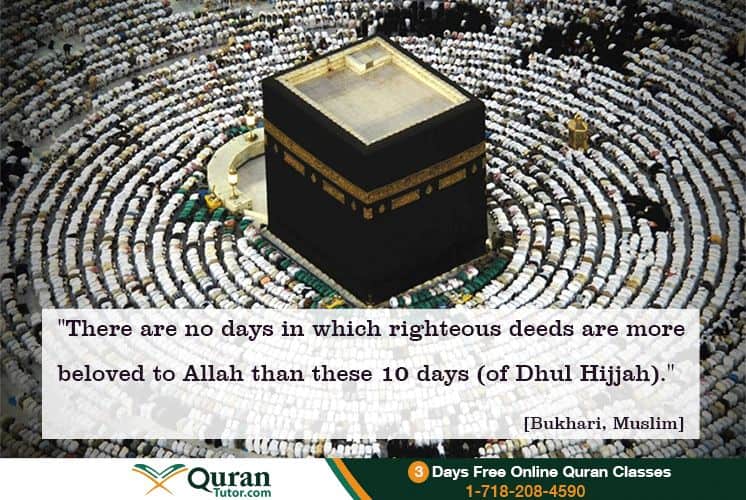The Blessed First 10 Days of Dhul Hijjah
The twelve months of Islamic lunar calendar come with their own speciality. One month comes with the fasts, the other month comes with Eid-ul-Fitr, another comes with the glorious day of the birth of Prophet Muhammad (PBUH), while there are other months that come with exponential increase in the reward for good deeds. One month that stands out in this category of months is Dhul Hijjah.

Dhul Hijjah is the 12th month of the Islamic lunar calendar and it is primarily famous and renowned for the occasion of Hajj and Eid-ul-Adha that come in this month. There is another significance of this month as well, which is the first ten days of it that are regarded as the holiest and blessed of days. Regarding these days, Prophet Muhammad (PBUH) said in a hadith:
“No deed are more virtuous than deeds on these days.”
The Companions asked:
“Not even Jihad (fighting in Allah’s cause)?’
He replied:
“Not even Jihad for the sake of Allah, unless a man goes out risking himself and his wealth for the sake of Allah, and does not come back with anything.” (Bukhari)
From the hadith it is clear that Prophet (PBUH) it is clear that the deeds committed in these ten days of Dhul Hijjah are the best of all the deeds and there is no equivalent to them when it comes to the reward they carry.
The Holiness and sacredness of these ten days is evident from the hadith, however, within these ten days there are two specific days that are even more sacred because of their religious and historical significance. The two days and their importance are discussed in the lines below.
Yawm-al-Arafat:
Yawm-al-Arafat is the 9th day of Dhul Hijjah and it is the day when the pilgrims gather on the Arafat plain and there they perform praise of Allah Almighty and worship Him excessively. The day of Arafat is important because of two reasons.
- The first reason is the fact that on this day Allah Almighty completed the religion of Islam and the last revelation was sent on Prophet Muhammad (PBUH). For Muslims it is the most important of days as in this day Allah Almighty completed His blessing of guidance of mankind and told Muslims that He has selected Islam as their religion. Thus, because of the completion of the guidance from Allah Almighty, the day of Arafat is held revere compared to the rest of the days.
- The second reason why the day of Arafat in Dhul Hijjah is of significance is that it is on this day that Allah Almighty took the covenant from all the progeny of Hazrat Adam. Prophet Muhammad (PBUH) spoke of the importance of that oath in the following way:
“When Allah created Adam, Allah took covenant from him in a place Na’maan on the day of Arafat, then He extracted from him all the descendants who would be born until the end of the world, generation after generation, and spread them out in front of Him in order to take a covenant from them also. He spoke to them face to face saying: “Am I not your Lord?” and they all replied: “Yes, we testify to it.” Allah then explained why He had all of mankind bear witness that He was their Creator and only true God worthy of worship. He said: “That was in case you (mankind) should say on the Day of Resurrection, ‘Surely, we were unaware of this. We had no idea that You, Allah, were our Lord. No one told us that we were only supposed to worship You” (Al-Bani)
The narration shows that it was on this day that Allah Almighty proclaimed of His Lordship on this very day, thus, for every Muslim this day should be of utmost importance as they got to meet their God on this day.
Moreover, Allah Almighty also increases His forgiveness in this day as well, as Prophet (PBUH) said in one of His hadiths:
“There is no day on which Allah frees more people from the Fire than they day of Arafat. He comes close and expresses His pride to the angels saying, ‘What do these people (the pilgrims) want?’” (Muslim)
Thus, the hadiths show that the day of Arafat is of grave importance from religious and historical perspective for a Muslim and special worshiping preparations should be made on this day.
Yawm-an-Nahr:
The Yawm-an-Nahr is the tenth day of Dhul Hijjah and it is the day when Muslims perform the major Hajj ritual of Sacrificing an animal as the order of Allah Almighty. Pertaining to the significance of this day, Prophet Muhammad (PBUH) said in His hadith:
“The greatest day of Hajj is the Day of an-Nahr.” (Albani)
Therefore, for pilgrims this day is of grave importance and the best of all the days they take while performing Hajj.
In the time of Jahiliyaa there were two days in which the people would celebrate and make joy. Prophet Muhammad (PBUH) addressed pertaining to those days in the following way:
“I came to you and you had in Jahiliyyah, two days of play and amusement. Allah has replaced something better for you. The Day of an-Nahr and the day of Al-Fitr.” (Ahmad)
Thus the tenth day of Dhul Hijjah stands for the day of Eid and it is on this day that all the Muslims all across the world celebrate the auspicious occasion of Eid-ul-Adha on this day and try spreading happiness and joy all over.
Recommended Deeds:
Although any deed that is committed for the praise, worship and glory of Allah Almighty with the right intentions is a good deed to be undertaken in the ten days in general and these two days in particular, however, the more rewarding deeds like being on Hajj or Umrah on these two days, or fasting on the 9th Day and slaughtering an animal on the 10th day are some of the recommended deeds that a Muslim can undertake in these days.
Conclusion:
In a nutshell, the month of Dhul Hijjah is one of the holiest months that a Muslim can get hold of in the year. Within this month there are ten days that take the lead over the rest of the days in the rest of the months and within these ten days are two days that are special compared to rest of the two days. Therefore, it is imperative that a Muslim values these days and tries to commit as much good deeds as possible in these days.









